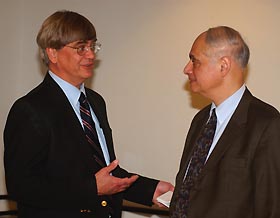|
This is an archived article. For
the latest news, go to the Advance Homepage
For more archives, go to the Advance Archive/Search Page. |
||
|
Alcohol Research Center For a quarter of a century, learning more about the causes and treatment of alcoholism has been the primary goal of the Health Center's Alcohol Research Center. Its research initiatives have led to major scientific advances and brought millions of dollars in funding to the Health Center.
As the Center celebrated its 25th anniversary, the National Institutes of Health/National Institute of Alcohol Abuse and Alcoholism (NIH/NIAAA) announced that the Center's funding will be continued for another five years. "This is a tremendous achievement and speaks to the high level of productivity, continued accomplishments, and dedication of our clinic investigators and staff," said Victor Hesselbrock, a professor in the Department of Psychiatry and holder of the Physicians Health Services Chair in Alcohol and Substance Abuse, who has been director of the Alcohol Research Center since 1993. Ernestine Vanderveen, deputy director of the Office of Collaborative Research at the NIAAA, said "We know this center to be productive and to accomplish what it has promised. This center is critical to help open doors for new opportunities for alcohol research." Established in 1978 by a research center grant from NIH/NIAAA, the Alcohol Research Center is one of four elite centers in the country that have enjoyed continuous funding from the NIH. It is the only one devoted to researching the clinical aspects of alcoholism. Its efforts have led to scientific advances in behavioral and pharmacological treatments, the identification of vulnerability factors, and the development of several new clinical research tools. Founding director Dr. Roger E. Meyer said the Center is primed to be a leader in pharmacological interventions in the next decade. "I have great pride in having been here at the beginning," he said. The Center continues to draw research funding from other sources as well, including the World Health Organization, the Robert Wood Johnson Foundation, private industry, and other NIH branches. A total of $7.5 million in funding this year alone will bring significant economic benefits to the Health Center and to Connecticut. As funding grows, so have investigators' research activities, which now include programs that deal with psychoactive substances, such as heroin, marijuana, and cocaine; pathological gambling; and HIV/AIDS. A. Thomas McLellan, professor of psychiatry at the University of Pennsylvania, said the Alcohol Research Center is one of a few places in the world that offers junior scientists and residents the opportunity to be involved in cutting-edge science in addiction studies. Although the focus of individual investigations varies, all the Center's research remains grounded in three basic scientific questions: What is the nature of addiction? Why are some individuals more vulnerable than others? and, What mechanisms account for the effectiveness of various treatments for different types of addictions? "Our research is guided by these questions and has led us to scientific advances in the understanding of the genetics of alcoholism, the characteristics of children at-risk, craving, the symptoms of alcohol and drug dependence, and the effect of alcohol and drugs on brain functions," said Lance Bauer, associate professor of psychiatry and associate scientific director of the Center. "Our research findings are published regularly in recognized medical, psychological, and addiction journals and have provided information to the Governor's Alcohol and Drug Policy Council." The Institute for Scientific Information ranks the Center eighth in the world in terms of materials cited. The Center's accomplishments include:
The Alcohol Research Center celebrated its 25th anniversary April 4 with presentations from special guests from the NIAAA and elsewhere. Speakers included Philip E. Austin, UConn president; and Dr. Peter Deckers, executive vice president for health affairs at the Health Center; Dr. David Goldman, chief of the Laboratory of Neurogenetics at NIAAA; Dr. Hesselbrock; and Dr. Leighton Huey, chairman of the Department of Psychiatry. |

